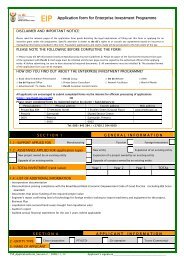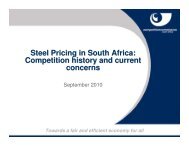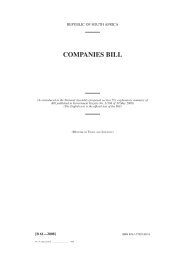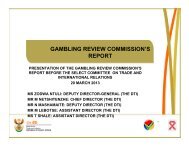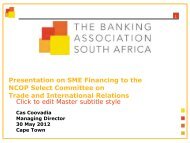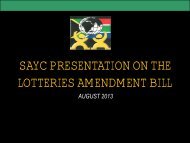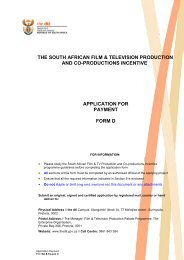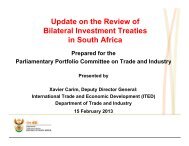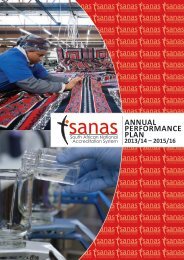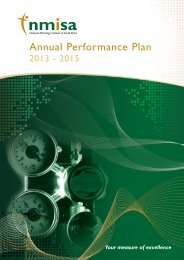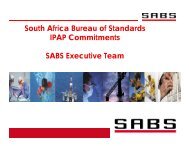Copyright Review Commission Report - ICT Law and Regulation ...
Copyright Review Commission Report - ICT Law and Regulation ...
Copyright Review Commission Report - ICT Law and Regulation ...
- No tags were found...
Create successful ePaper yourself
Turn your PDF publications into a flip-book with our unique Google optimized e-Paper software.
of the audit reports for the respective periods.) The amounts involved are significant <strong>and</strong> warranted aformal investigation. Based on the investigations carried out, the members were never provided withsatisfactory answers as to what happened to the money.7.1.3. The CRC believes that sound corporate governance would have been able to deal with the above-mentionedsources of the problems. Examples of where corporate governance failed SARRAL are listed in Table 2:Table 2: Examples Where Corporate Governance Failed SARRALCorporate Governance GapsKing II RequirementsPotential Implications of Non-AdherenceThe constitutive documents (theMemor<strong>and</strong>um <strong>and</strong> Articles ofAssociations) were badly worded<strong>and</strong> contradictory.a.For example: Section 48 of theArticles of the Association says, “TheBoard shall pay <strong>and</strong> defray theexpenses <strong>and</strong> liabilities of thecompany, incurred in the exercise orenforcement of the rights vested inor controlled by the company, out ofthe money received by company.”The extract from Rule 17: “The boardof directors may from time to timedetermine the rates of commission. Itwill charge any member or nonmember.”King II is silent on the matter.Due to this ambiguity, the directorsthought that they could apply any ofthe two principles, depending on thecircumstances.For about 40 years, they applied a‘commission-based principle’ <strong>and</strong>when they noticed a deterioration ofthe financial position of the company,the other principle was adopted.Both cannot be done. It is either a‘recovery of expenses’ or‘commission-based’.b.The constitutive documents (theMemor<strong>and</strong>um <strong>and</strong> the Articles of theAssociation) were in conflict with theCompanies Act of 1973 (amended).According to the Articles ofAssociation, the quorum for theSpecial Resolutions was threemembers <strong>and</strong> the simple majoritywas required for Special Resolution.The directors were not prohibitedfrom voting <strong>and</strong> all directors were themembers.According to Section 56 <strong>and</strong> 62 ofthe Companies Act of 1973 (asamended), for a Special Resolutionto be effective at least 75% of themembers present should vote infavour of it. The quorum for theSpecial Resolution is one-fourth ofthe total membership.The directors (three membersconstituted a quorum) could pass aSpecial Resolution without theparticipation of any of the ordinarymembers.- 47 -



